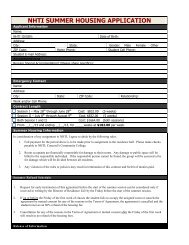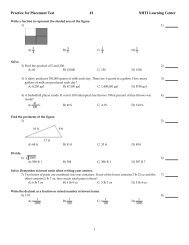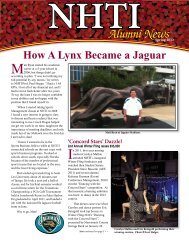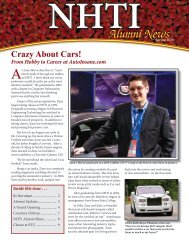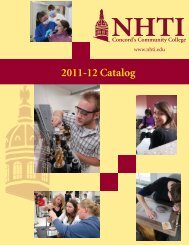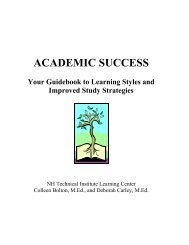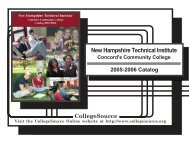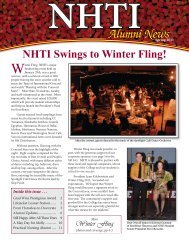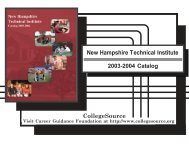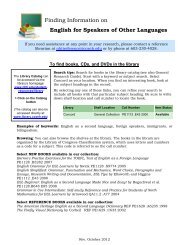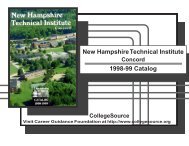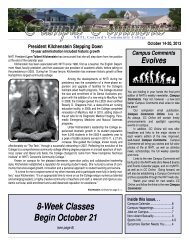Course Descriptions 11-12 - NHTI - Concord's Community College
Course Descriptions 11-12 - NHTI - Concord's Community College
Course Descriptions 11-12 - NHTI - Concord's Community College
- No tags were found...
Create successful ePaper yourself
Turn your PDF publications into a flip-book with our unique Google optimized e-Paper software.
C++ and Java will be used. This course covers intermediateand advanced topics with extensive hands on programming.Key OOP foundation capabilities of data abstractions,inheritance and polymorphism will be covered. Topics in C++specifically covered will be pointers, operator overloadingand multiple inheritance. (Prerequisite: CP 107; orpermission of department head of Computer EngineeringTechnology)CP 240 Programming for Windows Operating Systems 3-3-4The Microsoft Windows API and Microsoft.Net Frameworkwill be covered from Windows Applications to full utilizationof the Internet. Microsoft Visual Studio.Net with itsintergraded development environment will be studied andutilized. Topics include Windows services, DLLs, accessingdatabases using ADO.NET, programming for the internetusing ASP.NET, .NET assemblies, and advanced features ofprogramming languages used to access the Widows API and.NET platform. Experience will be gained using extensivehands-on laboratory assignments. (Prerequisites: CP 107 andCP 235 or permission of department head of ComputerEngineering Technology based on having introductoryprogramming skills with languages such as Java, C++ orclassic Visual Basic)CP 252 Networking and Internet Technologies 3-3-4This course provides the student knowledge and skills in adiverse range of topics including structured query language(SQL), client-server programming, selected internetapplications and LAMP (Linux, Apache, MySQL and PHP). SQLsubtopics include relational database concepts, the SQLlanguage and relational database design. Client serverprogramming is studied in C++ using socket APIs and Javausing socket classes. Selected internet applications includedomain name system (DNS), hyper-text transfer protocol(HTTP) and file transfer protocol (FTP). LAMP topics include aLinux overview, Apache web server configuration, dynamicweb pages using PHP and MySQL relational database. Eachstudent is also required to define, implement, demonstrateand present a networking project during the last severalweeks of the course. (Prerequisites: CP 107 and CP 235 orpermission of department head of Computer EngineeringTechnology)CP 260 Computer Real Time Interfacing 3-3-4Interfacing computers to the outside world is the focus ofthis course. Computers are commonly used to gather dataand to control processes in medical equipment, researchprojects and manufacturing. The course content focuses onpractical real time (fast response) and multithreadedprogramming techniques used in interfacing with computerinputs and outputs. The course is divided into two majorparts. First, a programmable logic controller industrialcomputer using the language relay ladder logic (Booleanalgebra based) is used to teach the fundamentals of real timecontrol. The second part covers multithreading programmingtechniques and issues including resource sharing, deadlock,critical sections, mutexes, and events. A final project ispresented to the class. (Prerequisite: CP 107; corequisite: CP235; or permission of department head of ComputerEngineering Technology based on introductory knowledge ofC++ or Java)CP 301 Computer Project Definition 1-0-1Students will elect this course as a first phase to ComputerProject CP 303. During this course a student selects a projectwhich is either provided by an industrial sponsor or chosenby the student. The selections are made with the guidanceand approval of the instructor. The student will meet withthe sponsor to initiate the project and then will write aspecification to define the project. (Prerequisite: CP 107 andCorequisites: CP 235 and CP 260; or permission ofdepartment head of Computer Engineering Technology)CP 303 Computer Project 1-4-3The student will complete the project defined in CP 301while maintaining logbook documentation, providing theadvisor with progress reports. In addition, a formal oralpresentation describing the project and a demonstration isrequired. (Prerequisites: CP 301 during the precedingsemester, CP 107, CP 235 and CP 260; or permission ofdepartment head of Computer Engineering Technology.Strongly recommend having previously taken or to beconcurrently taking CP 222, CP 240 and CP 252.)Criminal JusticeCJ 101 Introduction to Criminal Justice 3-0-3This course presents the history, development and currentstatus of the criminal justice system in the United States, andthe challenges it faces. When appropriate, the opportunity istaken to visit relevant agencies.CJ <strong>12</strong>1 Criminal Procedure 4-0-4This course analyzes the constitutional issues in the UnitedStates which have direct bearing on the role and policies ofcriminal justice agencies. Application of these issues as theyrelate to investigation, arrest, pre-trial and appeal will beemphasized. The course is a combination of the case law andlecture method.CJ <strong>12</strong>3 Criminal Law 4-0-4This course combines an examination of the historical originsand development of criminal law as a form of social control.It will include the general principles of constitutional andstatutory factors as they pertain to criminal liability, defensesto criminal charges and sentences. The final emphasis isplaced on the substantive aspect of criminal law and how itdiffers from civil law.CJ 150 Criminology 3-0-3This course is a detailed analysis of the development ofcriminological theory, embracing the contributing disciplinesof biology, psychology, sociology, political science andintegrated theory combining those disciplines. Attention isalso paid to the offender/victim relationship.CJ 205 Police Administration and Operations 3-0-3This course covers the principles of police organization,administration, along with community policing, as well as theselection, training, promotion and socialization of officers. Itdeals with the conflicting roles that the police and individualofficers face in today's society as part of the justice system. Italso examines issues involving the influence of research,8/17/20<strong>11</strong> <strong>NHTI</strong>, Concord’s <strong>Community</strong> <strong>College</strong> <strong>Course</strong> <strong>Descriptions</strong> 20<strong>11</strong>-20<strong>12</strong> 13



